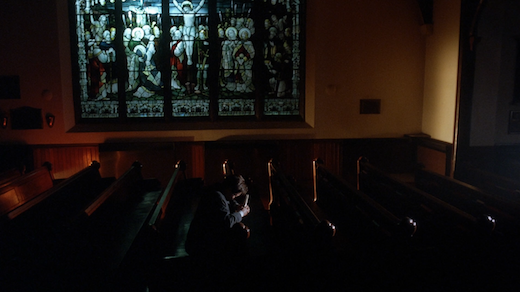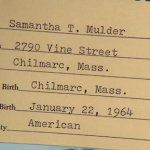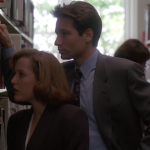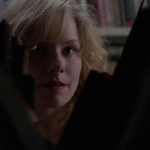 Mulder has to know.
Mulder has to know.
Conduit: Season 1 Episode 4
Written by Alex Gansa & Howard Gordon, Directed by Daniel Sackheim
First aired October 1, 1993
Conduit is a tricky episode. On the surface it seems simple: a girl with a brother disappears in a case that suggests aliens, which triggers Mulder’s Samantha Complex. That in and of itself would make for a decent episode—I love the first season for spending more time looking at the long-term effects of Mulder’s trauma than faking us out with the possibilities of what “really” happened to Samantha. But there’s more to Conduit than just rehashing Mulder’s pain.
There are a couple of things in the cold open that I like. First, there are no aliens and very few special effects, which centers the drama on the characters. This allows us to see how self-sacrificing and badass Darlene is. How could we not feel for her? She touched a molten doorknob, then recoiled only long enough to see that her hand was fucking smoking before she shoved her seared flesh into an oven mitt. No time to waste when your kid’s calling your name.
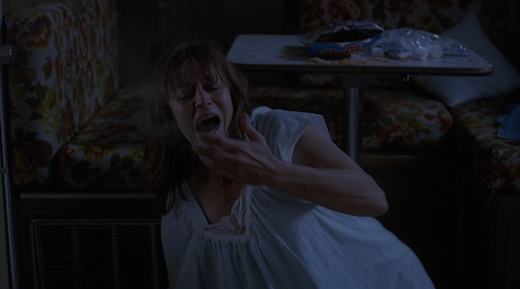 Poor Darlene.
Poor Darlene.
Second, I like that Darlene’s socioeconomic status is established right away. I don’t know what Carrie Snodgress’ natural accent is, but even without Darlene shouting “ROUBAAAE!” in her working class accent, we know that she’s not a rich woman. We can also see that she’s a single mother. Given the age disparity of her two children, it’s possible that Ruby and Kevin have different fathers. These subtle cues (and Darlene’s history) mean that we’re irritated but not surprised later on when the Sheriff writes off the entire Morris family as white trash.
Mulder and Scully, of course, do not think the Morris family are trash. Both of them struggle with what they think happened to Ruby. Both question Darlene’s credibility as a witness in her daughter’s abduction. But regardless of what they think happened at any given moment in the episode, neither of them ever dismiss her pain or suggest that she’s only fishing for attention.
So after the credits we open with Scully in Blevins’ office. Blevins is a villain twisting his mustache for some reason debating the validity of Mulder’s latest case without allowing Mulder to defend himself. Blevins prods Scully to say that Mulder’s personal feelings have undermined his investigative abilities, to the point of shoving Samantha’s file under Scully’s nose. He demands to know if she’s heard about “…all this.”
Scully is understandably uncomfortable with the position she’s put in, and Blevins tries to soothe her with some “it’s okay, you can trust me, now tell me what I want to hear” shibizzness. In a fictional context as a way to remind us of Mulder’s past, and as foreshadowing for how hard this case will be for him, the scene works. But when you stop and think about it? A supervisor discussing deeply personal events in one employee’s life and demanding an evaluation of their mental state from another employee, possibly as justification for dismissal? I can’t even begin to list all of the things that are wrong—not to mention illegal—about that. It’s a short scene with no further payoff, but I highlight it because it’s one of a few instances in the episode when people in power try to sweep issues under the rug merely by rolling their eyes.
 “Okobogee.”
“Okobogee.”
We then cut to Mulder, who is completely fine with Scully not crediting the case. That just means he gets to show off his fun slideshow presentation. He spent probably the last hour lovingly preparing it for her.
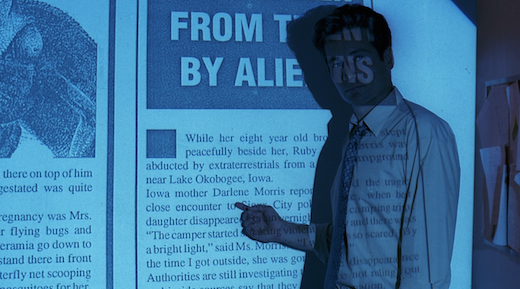 He practiced this.
He practiced this.
If the hint in Blevins’ office wasn’t heavy-handed enough, we see Mulder become entranced by a photo of a young Ruby that looks quite a bit like the photo in Samantha’s file. He even pauses to stroke the photo. I can plainly see what they were going for—I think we all can—but they are unsuccessful and the result is uncomfortable. Moving on!
I’m not altogether sure what they were going for with Kevin. I know that working with children in film is very difficult. I can’t help but wonder if they were going for sad and scared but the poor kid gave them angry and standoffish instead. From the first moment we see him, angrily shouting, “Ruby’s gone!” to the scene when Mulder approaches and tries to talk to him, only to be told that the binary code is “…coming from there,” as he points at a staticky television, uh…Kevin’s creepy. He reminds me vaguely of the ten-year-old Tom Riddle in Harry Potter and the Half-Blood Prince. I may be the only one, but there it is.
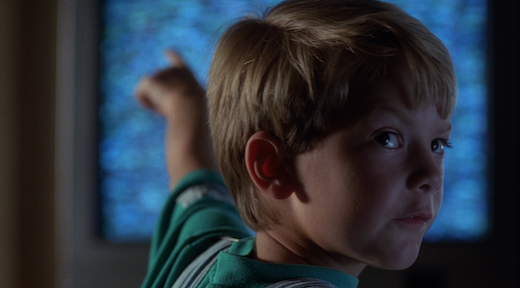 Relax, NSA. It’s just a sonnet.
Relax, NSA. It’s just a sonnet.
And then we meet the Sheriff of Slut-Shaming, played by Michael Cavanaugh. Every second this guy was on screen I wanted to punch his face. The sheriff dismisses Ruby’s case because she is not a perfect victim: she drinks and has sex. (The horror! I was surprised the sheriff didn’t wear his pearls specially to clutch at them during this scene.) I probably don’t need to tell anyone fantastic enough to read this blog that law enforcement doesn’t have the best track record when it comes to believing victims. What makes this episode ahead of its time is that this Sheriff looks like the piece of shit he is. In this scene he’s basically admitting that he did nothing to investigate Ruby’s case, and that if she’s dead it’s her own fault because she drank and had sex. And Mulder, the hero of the show, calls him on it. The only thing that disappoints me is that Scully doesn’t back him up. In fact the only real complaint I have about this episode is that Scully doesn’t have much of an active role.
I love the library scene for the aesthetic but it does pretty much nothing for the plot.
Ah, the Pennsylvania Pub: another one of The X-Files’ weird dives in the middle of nowhere. I don’t know why but this is one of my favorite scenes in the episode. In keeping with the “don’t trust the Man” theme, the bartender Kip (played by Donald Gibb) is a way more interesting and reliable source of information than Sheriff Shitstain. I love that Mulder feels bizarrely at home in a biker bar, and also has no qualms deliberately baiting a guy five times his size.
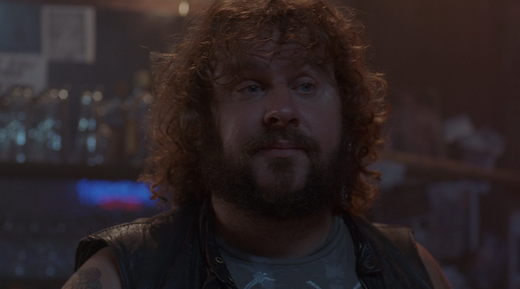 Kip sure is impressed.
Kip sure is impressed.
Which leads me to another thing that I love about the early seasons: Mulder is just plain antiestablishment. The idea of the Truth is there from the beginning, but before the mythology takes over we get to see that Mulder is such a sarcastic little fucker that he became an FBI agent purely to get up the government’s nose.
Meanwhile Scully makes a face, which can be loosely interpreted as, “Mulder please don’t provoke them because: 1) I don’t want to die, 2) we haven’t even made out yet, and 3) I have plans this weekend.”
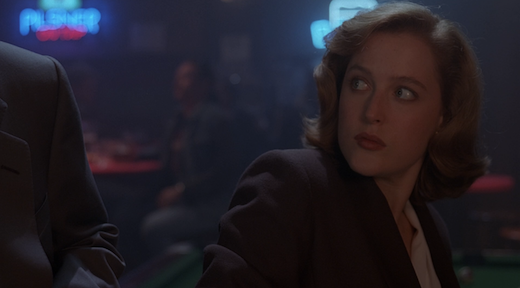
The NSA scene is just…so depressingly realistic. And even more topical now than it was twenty years ago. Here we have the NSA barging in on two federal agents spouting “national security” for what amounts to random bits of satellite code, and then smashing up an entire home and smiling like assholes while doing it. Seriously it depresses me so much that this is more likely now instead of less. (I admit that I absorbed absolutely nothing during the part of the scene when Mulder was shirtless. In fact, I watched this episode with a friend a while ago and she asked a question which depended on me having listened to the dialogue. At which point I realized that I had no idea what she was talking about. I’d seen this episode twice in the past six months. Oops?)
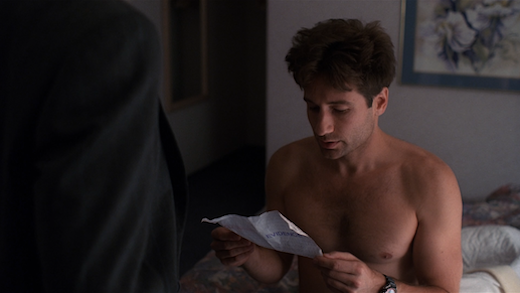 Something about a satellite? I think?
Something about a satellite? I think?
There are a lot of thematic parallels between this episode and Deep Throat, and one of them is Mulder challenging Scully’s (and by extension our) unquestioned obedience to authority. When he points out how ridiculous it is that the NSA would consider an eight-year-old’s scribbling a national security threat, and then scoffs, “People call me paranoid,” I think there’s an invitation there to really think about it.
 Judge me but I am head over heels for this outfit. I love tweed.
Judge me but I am head over heels for this outfit. I love tweed.
The wolves in the Lake Okobogee scene should feel completely incongruous and ridiculous. I mean, a white wolf appearing at the edge of the forest to commune with Mulder (and Scully), leading them to a grave? C’mon. I don’t know why it works; my generosity as a devoted viewer, perhaps, or my love of wolves, or perhaps just the way Duchovny and Anderson play it, with wonder but without anthropomorphism. But it does work. The appearance of the wolf is a beautiful reminder of the uncanny.

And I really, really love that Mulder does not shoot at the wolves. Nor does he shout at them, or even make disparaging remarks about their presence at the grave. I know that’s a small thing but it’s an important character note to me. I love that even though he has a gun, he obviously has no intention of harming them. I grant you that Dances with Wolves came out only a year or two before this, so this scene may have been influenced by Two Socks. Which makes it all the more a relief that Mulder does not go all cultural appropriation and start talking about wolves as his spirit animals.
Mulder’s desperation to find out who’s in the shallow grave and his behavior during Tessa’s interrogation are telling. He’s not acting rationally, and in his heart of hearts he knows that. But he can’t help himself, especially as he becomes more and more convinced that Ruby may be dead. One wonders if he’s hoping for closure in Ruby’s case as a substitute for the closure he never from Samantha’s disappearance.

(I really don’t like it that Tessa got an abortion and also murdered Greg. I mean, why did she kill him? If she already got the abortion she didn’t need him to help support a child, so she didn’t kill him for running out on that responsibility. Was it jealousy? That’s weak, and the implication is that a person who gets abortion ≅ a person who commits murder. Which is bullshit.)
The next important scene comes when Mulder and Scully are on their way back to the lake. Mulder’s speech, that when he was a child he kept hoping that he would walk back in the room and Samantha would somehow be there—that he’s still walking into that room—is great. It’s intimate and raw without being over-dramatic (Duchovny underplaying hella works here). It also has that quality that happens sometimes when people just say something—no ceremony, no hesitation, just here is this searing heartbreaking thing that you should probably know, and then I’ll move along quickly so I don’t have to think about what I just told you. Like, “Oh you know, by the way ever since my sister was abducted I’ve carried the guilt that I couldn’t protect her, and no matter how hard I try to atone, my whole life won’t be enough to make it up to her. Oh look there’s the van!”
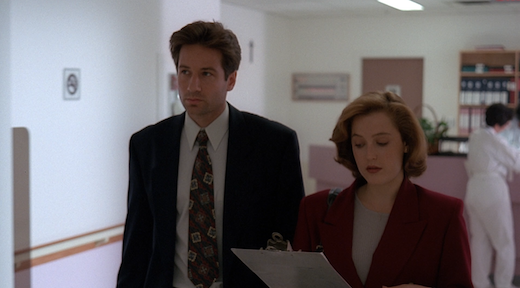 Their expressions look so hipster in this picture it’s adorable.
Their expressions look so hipster in this picture it’s adorable.
The manner of Ruby’s return makes no sense, although the moment between Kevin and Mulder is cool. But seriously, what do we really think happened to Ruby? She was obviously abducted and held against her will. We’re told the evidence that suggests she was ~taken~ what with the funky medical symptoms and whatnot, but she never tells her story. She’s prevented, first from fear of those who took her. And then, in perhaps an even crueler move, her own mother silences her out of a desire to protect her.
I don’t blame Darlene for encouraging Ruby to keep quiet; she makes a compelling argument. After all, Darlene was a child when she saw what she thought was a UFO, and she’s suffered for saying so her entire life. She knows the price of public honesty. Whether we’re talking about domestic abuse, rape, or stalking, survivors speaking up for themselves does not guarantee justice. Additional suffering, however, is guaranteed. This scene leans heavily on the diminished credibility of female victims; from that position it’s easy to relate to both Darlene and Mulder’s sides of the argument even if we don’t give credence to alien abductions.

Mulder’s insistence that she should be able to talk about it is equally understandable. He’s the walking embodiment of what happens when a trauma survivor isn’t allowed to talk. He just wants to keep Ruby and Kevin out of that room he goes into every day. It’s so sad that the only solution Darlene sees to protect her daughter is to tell everyone that she “spent the last month on the back of a Harley;” that feeding people’s stereotypical view of Ruby is better than telling the truth. She’s firm until Mulder asks, “Is that what you’re going to tell Kevin?” Darlene’s face falls. To protect Ruby she would have to invalidate Kevin; to protect Kevin she would have to expose Ruby to public ridicule. It’s not for me or Mulder or anyone to say whether it’s “better” for trauma survivors to speak up publicly or not. But Mulder is begging us to remember that trauma survivors have to talk to somebody, publicly or privately, because if they don’t they’ll never heal.
I wonder if the true conduit in this episode isn’t Kevin, but Mulder. It’s fitting, if sad, that the episode ends without resolution. And the final shots are sad, very much so, with poor Mulder alone in a church, sobbing over a picture of himself and Samantha. There is, though, a lot of value in showing how much pain Mulder is in. Even in 2016 I can’t picture a male character openly crying on television. They also successfully avoid the Man Pain ™ trope. Mulder became frustrated with Scully (the NSA stunt, after the interrogation), but he didn’t insult her or lose his temper as a result of his pain. Nor do we get the implication that it’s Scully’s job to make him whole again. He’s just…been through some shit, and it’s affected him profoundly.
But the ending isn’t bleak. Yes, Ruby will have to decide how she is going to cope with what’s happened to her, but she’s alive. She’s home. And while Mulder is alone in the church, he’s not alone in the world: Scully is there, listening to the transcription of his hypnosis. She’s reaching out to him in her own quiet way. Just like us, she is beginning to understand how much he wants to believe, and why.
